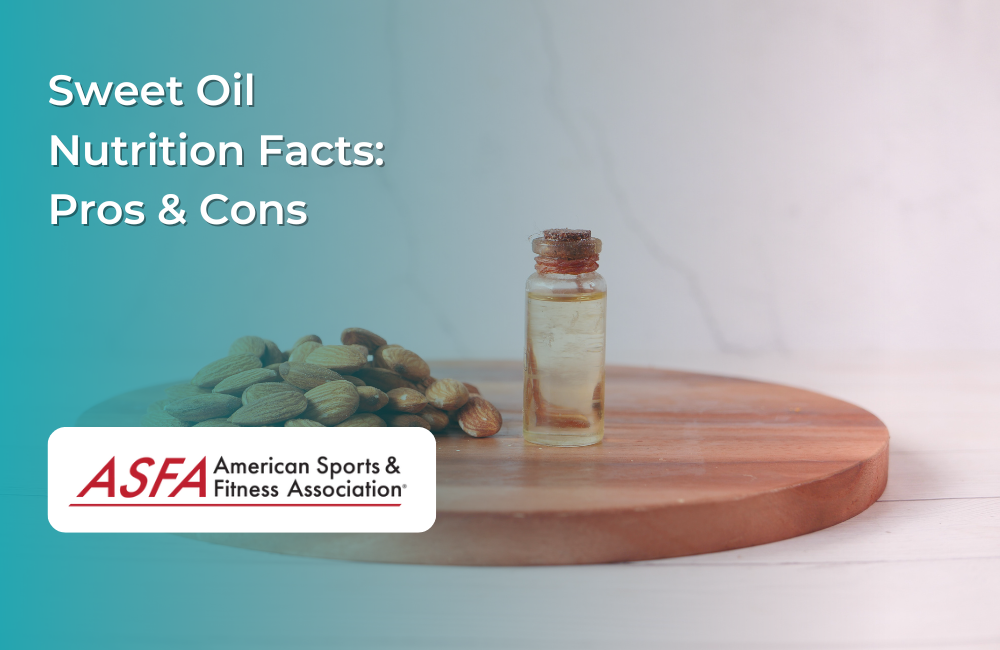Sweet oil, commonly referring to olive oil or almond oil, is widely used for culinary and medicinal purposes. It is rich in healthy fats and antioxidants, offering several health benefits when used in moderation. However, its calorie density and potential for oxidation should be considered when incorporating it into a balanced diet.
Sweet Oil Nutrition Facts, Pros, Cons (Per One Tablespoon)
-
Calories: 120
-
Protein: 0g
-
Carbohydrates: 0g
-
Fat: 14g
-
Monounsaturated Fat: 10g
-
Polyunsaturated Fat: 2g
-
Saturated Fat: 2g
-
-
Vitamin E: 2mg
-
Omega-3 & Omega-6: Present in small amounts (varies by type)
Definition and Origin of Sweet Oil
Sweet oil, often referred to as sweet almond oil, is derived from the seeds of the sweet almond tree (Prunus dulcis). This tree, native to the Mediterranean region, has been cultivated for centuries, prized for its oil-rich seeds. Sweet oil is renowned for its mild flavor and high nutritional value, making it a staple in cooking, cosmetics, and pharmaceuticals. Its numerous health benefits, including skin health and heart disease prevention, have made it a popular choice among health-conscious consumers. Whether used in culinary dishes or as a natural moisturizer, sweet oil continues to be a versatile and valuable ingredient.
Pros of Sweet Oil
High in Monounsaturated Fats
-
Rich in monounsaturated fats, which support heart health and reduce inflammation
-
May help regulate cholesterol levels when used as part of a balanced diet
-
Additionally, unsaturated fatty acids, particularly monounsaturated fats found in olive oil, are resistant to oxidation and linked to improved cardiovascular health, offering advantages over saturated fats like coconut oil
Contains Antioxidants
-
Provides vitamin E and polyphenols that protect cells from oxidative stress
-
May help reduce the risk of chronic diseases related to inflammation
-
The composition of fatty acids in the oil also plays a crucial role in its health benefits, with monounsaturated fatty acids being more stable and beneficial compared to polyunsaturated fats.
Supports Skin Health and Hair Health
-
Used topically for moisturizing and soothing dry skin and scalp
-
Helps maintain skin elasticity and may reduce signs of aging
Versatile for Cooking and Medicinal Use
-
Works well in salad dressings, sautéing, and baking
-
Used in traditional medicine for earaches and digestive support
Cons of Sweet Oil
High in Calories
-
Contains 120 calories per tablespoon, which can add up quickly if not used in moderation
-
Excessive intake may contribute to weight gain if not balanced with overall diet
Can Oxidize When Heated Too Much
-
Some varieties, like extra virgin olive oil, have a lower smoke point and can become unstable at high temperatures. Sweet oil, in comparison, is more stable than oils like soybean oil, which are prone to oxidation.
-
Using appropriate oils for cooking methods helps maintain nutritional integrity
May Cause Digestive Sensitivity in Some Individuals
-
High-fat content may cause digestive discomfort if consumed in large amounts
-
Some people may experience mild allergic reactions to almond oil. Additionally, the fatty acid profile of sweet oil is similar to that of other oils like corn oil, which is high in omega-6 fatty acids and linked to inflammation and other health issues.
Comparison to Other Oils
When comparing sweet oil to other popular cooking oils, several key differences stand out. Olive oil, particularly extra virgin olive oil, is celebrated for its high monounsaturated fat content, which supports heart health. Sweet oil, however, is rich in polyunsaturated fats, offering a different balance of healthy fats. Coconut oil, including virgin coconut oil, is high in saturated fats, which may not be suitable for everyone, especially those concerned about saturated fat intake. Sunflower oil, while a good source of vitamin E, is often highly processed and may contain trans fats, making it less desirable for health-conscious consumers. Sweet oil, being a cold-pressed and unrefined oil, provides a healthier alternative to many commercial cooking oils, offering a natural and nutrient-rich option for your kitchen.
Environmental Impact of Sweet Oil Production
The production of sweet oil is relatively eco-friendly compared to other oil crops. Sweet almond trees are drought-tolerant and require minimal pesticides and fertilizers, making them a sustainable choice for farmers. The traditional method of cold-pressing the seeds to extract the oil is energy-efficient and generates minimal waste, further enhancing its environmental credentials. However, it’s important to be mindful of the scale of production. Large-scale commercial operations may have a more significant environmental impact. To ensure you’re making an eco-friendly choice, look for sweet oil products that are certified sustainable and eco-friendly, often available in health food stores. This way, you can enjoy the health benefits of sweet oil while supporting sustainable agricultural practices.
Conclusion
Sweet oil, whether referring to olive oil or almond oil, is a heart-healthy, antioxidant-rich oil that supports overall well-being. It is versatile for culinary and topical uses, but its calorie density and potential oxidation at high heat should be considered. Using moderate amounts and choosing high-quality, cold-pressed varieties ensures maximum health benefits.
FAQs
Is sweet oil the same as olive oil?
Yes, the term sweet oil often refers to olive oil, but it can also mean almond oil depending on the context.
Can I use sweet oil for cooking?
Yes, but olive oil is best used for low to medium heat cooking, while almond oil is often used for drizzling or baking.
The fatty acid composition of sweet oil plays a crucial role in determining its suitability for various cooking methods, with monounsaturated fatty acids providing better heat stability and health benefits compared to polyunsaturated fats.
Is sweet oil good for weight loss?
It can be part of a weight-loss diet when used in moderation, but excess consumption adds extra calories.
Can I use sweet oil on my skin?
Yes, both olive oil and almond oil are used for moisturizing and soothing dry skin.
What’s the best way to store sweet oil?
Store it in a cool, dark place to prevent oxidation and rancidity.





